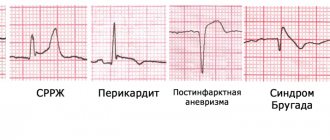Depression is a common neuropsychiatric disorder that is very often diagnosed in our time. There are many jokes about depression. Those who have never experienced it may consider it a harmless temporary condition. But there are different types of depression, with varying symptoms, signs and severity. Some types of this disorder can drive a person to suicide or completely deprive him of his quality of life.
Let's look at what types of depression there are, what the symptoms of this disease are, and what the disorder in general is. In recent years, depression has become so common among people that the problem has been called the “plague of the 21st century.” Scientists believe that such a rapid increase in psychoneurotic disorders among the population is associated with an increasing information load and an accelerated pace of life.
What is depression
Depression is a mental affective disorder that manifests itself in a decrease in vital activity, decreased mood, motor retardation, and impaired thinking in a person.
Mental pathology can be either episodic or chronic. Some uncomplicated depressive disorders go away on their own in people. In other cases, the condition may worsen and require mandatory medical and psychotherapeutic assistance.
There are different types of depression that have external and internal factors.
According to statistics, women suffer from depressive disorders 2 times more often than men. The prevalence of depression at the age of 15-30 years is 15-40%, at the age over 40 years – 10%, at the age over 60 years – 30%. Most of the sufferers are residents of large and developed cities.
Affective disorder significantly complicates a person's life. Against this background, organic diseases develop, and other existing nervous and mental disorders worsen.
Psychotherapists, clinical psychologists, and psychiatrists treat depression. Depending on the severity, treatment can take place on an outpatient basis or in a hospital.
Diagnostics
Early detection of cases of the disease is complicated by the fact that patients try to keep silent about the occurrence of symptoms, since most people are afraid of being prescribed antidepressants and their side effects.
Some patients mistakenly believe that it is necessary to keep emotions under control, and not transfer them to the shoulders of the doctor. Some individuals fear that information about their condition will leak out at work, while others are terrified of being referred for consultation or treatment to a psychotherapist or psychiatrist. Diagnosis of depression includes conducting questionnaire tests to identify symptoms: anxiety, anhedonia (loss of pleasure in life), suicidal tendencies.
Causes of depression
There is an opinion among people that weak, suspicious, spineless people are susceptible to depression. This is a big misconception. Many strong and famous personalities suffered from similar disorders. In fact, no one is immune from mood disorder. Experts say that about 90% of people living on Earth have experienced this condition at least once in their lives.
There are many causes of depression, let's look at the main ones.
- Traumatic events. Most psycho-emotional disorders occur after experiencing difficult events. This could be frequent stress, the loss of a loved one, divorce, conflict, bankruptcy, dismissal, fear, and the like. Any stress provokes frequent releases of cortisol and adrenaline (stress hormones) into the blood. They suppress the production of happiness hormones (serotonin, norepinephrine, dopamine) and a person ceases to experience joy and good mood.
- Hormonal disorders. Some chronic diseases, diseases of the endocrine system, and reproductive system can cause hormonal problems. Hormonal imbalances often occur in pregnant women and women who have recently given birth, as well as during menopause. Hormonal instability also occurs in adolescents during puberty. The level of hormones in the blood affects the nervous system, which is reflected in the psycho-emotional background.
- Diseases of the nervous system . Congenital or acquired diseases of the central nervous system can provoke disturbances in the chemical reactions of the brain and lead to a decrease in the production of neurotransmitters (chemical compounds vital for the functioning of neurons and nerve cells). Reduced levels of neurotransmitters lead to a negative emotional state.
- Somatic diseases. More often these are chorionic or severe diseases, accompanied by pain, physical and social limitations, and complex treatment.
- Hereditary factor. Depression is not an organic disease and is not inherited. But scientists have found that children raised in families where parents are prone to depression inevitably “absorb” this model into their character. Thus, children develop an increased predisposition to neuropsychic disorders.
Another risk factor for developing depression is diseases of the brain and cardiovascular system. According to statistics, clinically significant affective disorders are detected in 40-50% of patients who have suffered a stroke, in 50-60% of patients suffering from chronic cerebrovascular insufficiency and in 15-25% of patients with a history of traumatic brain injury. With TBI, depression may not appear immediately, but after several months or even years.
Depressive disorders are often observed in patients suffering from coronary heart disease, respiratory failure, cardiovascular failure, bronchial asthma, rheumatoid arthritis, and oncology.
In addition, depression often occurs with alcoholism and drug addiction. The factor is due to chronic intoxication of the body and numerous disorders caused by the use of psychotropic substances.
Depression in neurology and neurosurgery
If the tumor is localized in the right hemisphere of the temporal lobe, melancholy depression with motor slowness and retardation is observed.
Melancholy depression can be combined with olfactory, as well as autonomic disorders and taste hallucinations. Patients are very critical of their condition and have a hard time experiencing their illness. Those suffering from this condition have reduced self-esteem, their voice is quiet, they are in a dejected state, the rate of speech is slow, patients quickly get tired, speak with pauses, complain of memory loss, but accurately reproduce events and dates.
Localization of the pathological process in the left temporal lobe is characterized by the following depressive states: anxiety, irritability, motor restlessness, tearfulness.
Symptoms of anxious depression are combined with aphasic disorders, as well as delusional hypochondriacal ideas with verbal auditory hallucinations. Sick people constantly change position, sit down, stand up, and get up again; They look around, sigh, and peer into the faces of their interlocutors. Patients talk about their fears of foreboding trouble, cannot relax voluntarily, and have poor sleep.
Types of depression
Depending on the causes, symptoms and severity, depression is divided into several types. Let's look at each in more detail.
Subdepression
Subdepression is a pre-depressive state. A milder form of mood disorder that often does not require treatment. Subdepression occurs against the background of stress, psychological trauma, and circumstances to which a person cannot adapt quickly.
There are no organic disturbances in the functioning of the nervous system and brain during a predepressive state. A person may temporarily lose interest in the world around him, fall into despondency, melancholy, bad mood, and melancholy. At the same time, he retains the ability to objectively assess his condition, understands his problem and looks for ways to solve it. That is, he does not want to remain in this state and, although he does not yet have moral (sometimes physical) strength, he still believes in his recovery.
In most cases, subdepression goes away on its own without negative consequences.
Endogenous (cyclical)
This is one of the most complex and severe forms of depressive disorder, but it occurs infrequently (about 2% of all cases). The reasons are related to internal factors. Due to too severe events and illnesses experienced, a person experiences a disruption of chemical reactions in the brain. The body stops producing the hormones serotonin, norepinephrine and some other neurotransmitters. The sufferer loses the feeling of joy and the ability to experience other positive emotions.
Symptoms of endogenous depression can vary. Depending on the severity, the disorder manifests itself in the form of apathy, lethargy, adynamia, sadness, and suicidal thoughts. Endogenous depression develops sharply, sometimes without apparent external reasons. A person quickly “fades away” and if help is not provided in time, he can reach complete self-destruction. This type of affective pathology is treated clinically.
Psychogenic
The most common type of depression in our time is also called “classic”. The reasons for its development are human reactions to external factors. These can be any events or situations that have too strong an impact on the psyche. Psychogenic depression often develops in people who have suffered the death of a very close person, in those who are forced to care for a seriously ill person, in people with low material income living in unfavorable conditions. Psychogenic affective disorder often occurs in wealthy people who achieve goals and lose the zest for life. Unexpected dismissal, loss of a breadwinner in the family, moving to another city or country where there are no friends and relatives can also cause psychogenic depressive disorder.
A person suffering from this type of depression becomes emotionally labile, whiny, and gloomy. He may experience physical weakness, depressed mood, nervousness, irritability, and apathy. At the same time, efficiency is maintained and people around you often do not notice the changes. The sufferer himself understands that something is “broken” in him, but is in no hurry to seek help, hoping that it will go away on its own.
The danger of psychogenic depression is that, over a long period of time, it can cause organic changes in the nervous system, aggravating the condition. In the early stages, psychotherapy and light drug therapy help. In advanced cases, hospital treatment may be necessary.
Neurotic
People suffering from neurosis are prone to this form of affective disorder. As a rule, neurotics suffer from low self-esteem, increased anxiety, suspiciousness, fears, various phobias, and hypochondria. All this exhausts the nervous system and leads to a chronically depressed mood.
Neurotics rarely experience organic disorders in the body or serious hormonal imbalances. The cause of their depression is uncertainty, too much imagination, their own thoughts and a restless mind. A neurotic reacts to any difficult situation as if it were an apocalypse. Any surprise can knock him out of his usual rhythm of life.
With neurotic depression, a person becomes tearful, his mood changes a hundred times a day, negative thoughts are constantly spinning in his head, he is constantly waiting for something bad (what exactly, he cannot explain). At the same time, the patient retains an adequate assessment of his own condition. The unfortunate person is looking for help and is ready to do anything to get rid of the painful condition.
With competent psychotherapy and medication support, neurotic depression is completely reversible, like neurosis itself.
Asthenic
The cause of the asthenic type of depression is prolonged asthenia caused by increased mental and physical stress, chronic stress. Asthenia is a depletion of the nervous system that affects physical condition. A person begins to constantly feel tired, weak, and depressed. Against the background of asthenia, other symptoms may appear: headaches, insomnia, changes in blood pressure, increased sweating, tachycardia, tremors of the extremities.
During examination, the patient usually does not have any somatic diseases. But tormenting symptoms and chronic illness drive a person into depression.
To treat asthenic affective disorder, the patient is prescribed sanatorium rest, sedatives, and antidepressants. In fact, all that is needed in such cases is to get a good rest or change the lifestyle that causes chronic stress.
Hypochondriacal
Develops against the background of neuroses or previous physical illnesses (both in oneself and in loved ones). A person begins to worry excessively about his health. He constantly listens to his internal state, looks for symptoms of various (usually serious) diseases, and spends a lot of time searching for information about diseases.
Every gurgling in the intestines, tingling in the body or twitching of a muscle begins to seem to him a sign of a terrible illness. With thoughts about illnesses, he exhausts not only himself, but also those around him. A hypochondriac tends to run to doctors, constantly take tests and practically never part with a tonometer.
Due to constant negative thoughts and experiences, the nervous system of a hypochondriac is depleted. Depression occurs, which further aggravates the condition of the unfortunate person.
Hypochondriacal depression is often accompanied by all sorts of autonomic disorders, depriving a person of a person’s ability to work and quality of life.
With timely treatment, the disorder is completely reversible. Sometimes competent psychotherapy is enough.
Bipolar (manic)
It belongs to the group of mental illnesses and is rare. Predisposition to the disease is inherited; the exact causes of bipolar depression are unknown.
Periods of bad mood, apathy, decreased physical activity, and drowsiness are abruptly replaced by periods of increased emotionality, speech activity, enthusiasm, intense joy, and liveliness.
The disease develops gradually, which makes timely diagnosis difficult. The patient's emotional background becomes unstable. Any minor event can make him angry or cause pathological joy.
As the disease progresses, sudden changes in behavior occur more often. The danger is that in a depressed period a person can harm himself by attempting suicide.
Treatment for manic depression is mandatory. In most cases, the patient is prescribed medications that he must take constantly.
With proper treatment, bipolar disorder is completely controlled, and the patient can remain in remission for many years.
Psychotic
Just like bipolar disorder, psychotic-type depression is a serious illness that requires mandatory treatment.
This type of disorder occurs against the background of disorders of the nervous system or brain function. Attacks appear suddenly, without any connection with external factors. Their frequency and duration vary from person to person.
In addition to the standard signs of depression, the patient may experience speech disorders, hallucinations, stupor, confusion, and manic states. The person requires inpatient treatment.
Postpartum
A fairly common occurrence among women who have recently given birth. The causes of postpartum depression are hormonal imbalances that occur after such a serious load on a woman’s body.
Symptoms of the disorder can occur immediately after the birth of the baby, or several months later. Depression due to a malfunction of the female hormonal system occurs not only after a normal birth, but also against the background of a frozen pregnancy, miscarriage, or abortion.
Also, the cause of postpartum depression can also be psychogenic in nature - lack of help with the child from loved ones, poor material conditions, lack of sleep, or a woman’s unwillingness to be a mother.
As the hormonal levels stabilize, the woman’s psycho-emotional state normalizes. In some cases, medical attention is necessary.
Hidden
It belongs to the classic type of depression, but differs in that neither the sufferer himself nor the people around him notice serious internal problems. The person retains his ability to work, he can look very good, be sociable and even smiling. But when left alone with himself, he plunges into negative thoughts. Being in a social environment, he does not feel much interest in the world around him.
Often being in a bad and depressed mood, he tries not to show it to others, which only increases the load on the nervous system.
The danger of hidden depression is that a person can suppress it for a long time, pretending that everything is fine, but at one fine moment he will explode.
The accumulated internal tension will result in either serious aggression or a suicidal attack. Often, against the background of latent depression, people develop chronic diseases.
The main task of the patient is to recognize the problem and realize the need for help. The condition is reversible and responds well to therapy.
Narcotic (alcoholic)
It develops both in those who are not ready to give up addiction, and in those who are struggling with it.
Chronic alcoholic depression occurs against the background of chemical changes in the brain and body affected by toxic substances. This disorder is expressed in the gradual degradation of personality, attacks of irritability and aggression, and suicidal behavior.
When a person decides to give up drugs or alcohol, the level of “happiness hormones” in his blood drops sharply, and a chronic state of bad mood, apathy, and indifference to life sets in.
It is post-drug depression that becomes the main reason why a former drug addict or alcoholic takes up their old habits again. In addition, people with addictions have reduced resistance to stressful situations, and any difficulty in life encourages them to resort to alcohol/drugs.
Patients require medication and psychotherapeutic assistance.
Symptoms of depression
Depending on the type, the symptoms of depressive disorders may vary. But regardless of the form of affective disorder, there are a number of classic signs, divided into 3 types:
- Emotional – apathy, depression, low mood, tearfulness, irritability, loss of interest in work, the environment, and communication. Feeling of powerlessness, helplessness, hopelessness. Sometimes loss of the ability to experience strong feelings (love, compassion, joy) and experience vivid emotions. Lack of desires, plans, goals.
- Behavioral – isolation, avoidance of communication, refusal of entertainment and any activities related to responsibility. Difficulty concentrating, decreased physical activity, avoidance of problems and any difficulties.
- Physical – poor health, increased fatigue, weakness, sleep disturbance, appetite, frequent headaches. Intestinal problems, body pain, decreased libido, changes in blood pressure, cardiovascular disorders.







